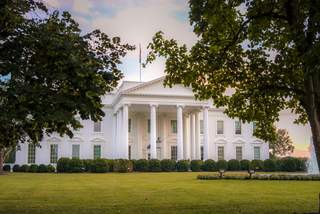
©Unsplash/Ana Lanza
Which Trends from Previous Years Remain in U.S. Trade Policy?
Elements that remain from the time under President Trump:
- For all the Biden administration’s appreciation of international partnerships: Strengthening and bolstering the domestic economy remain priorities, if necessary at the expense of allies. Although the Biden administration does not view international trade as a zero-sum game, it is considered natural for each country to defend its own jobs first. Important legislation passed during Biden’s first two years in office includes the Bipartisan Infrastructure Law (BIL) and the Inflation Reduction Act (IRA). Both contain requirements for the use of domestic materials (“local content” / “Buy American requirements”) that discriminate against trading partners. Right at the beginning of his term, Biden announced a stricter application of the “Buy American” regulations and established a “Made in America Office” in the White House. In the February 2023 State of the Union address, the President announced further expansions. The currently envisaged expansions seem to be aimed at ensuring that, in principle, all materials required for infrastructure projects (co-)financed at the U.S. federal level must be manufactured in the United States in the future and not just certain materials such as steel, as has been the case to date. Thus, Joe Biden’s (trade) policy also contains clear protectionist elements that could harm U.S. competitiveness in the long term.
- Criticism of the WTO: Despite a generally high regard for international cooperation, the Biden administration is also critical of the WTO. Back in 2016, the Obama administration blocked the reappointment of a member of the WTO Appellate Body in the final days of its term. The Trump administration maintained this blockade even when further members rotated out and the Appellate Body was then unable to act. Even under Biden, the blockade has not been lifted so far. Among other things, the administration has criticized the WTO’s dispute settlement body for interfering too much in domestic affairs, especially with regard to national security concerns. In addition, the organization has so far failed to find an appropriate way of dealing with China as a non-market economy and, at the same time, an economic heavyweight in the world.
- Criticism of China resulting in concrete measures: Under Trump, the United States introduced punitive tariffs on Chinese imports. The legal basis for this is Section 301 of the Trade Act of 1974, which allows the USA to take countermeasures in the event of unfair behavior by trading partners. China also responded with tariffs, and various escalation steps in the form of further tariffs followed in the months thereafter. In 2020, the United States and China concluded the “Phase One Deal,” which somewhat defused the conflict. However, many of the tariffs are still in place. While under the Trump administration, the United States’ high trade deficit with China and intellectual property theft were the focus of criticism, the USTR’s “2023 Trade Policy Agenda” highlights state-directed, non-market trade practices, as well as violations of workers’ rights and weak environmental regulations. However, the trade policy response to China’s unfair trade practices should be viewed in the larger context. The United States is now using measures such as export controls, but also other tools such as investment screening (soon possibly including outbound investment screening) and also industrial policy legislation such as the CHIPS and Science Act in systemic competition with China.
- “Economic security is national security”: Already under Trump, security considerations played an increasing role in economic policy measures. For example, in the case of tariffs on steel and aluminum, Trump made use of the long-unused instrument of tariffs under Section 232 of the Trade Expansion Act of 1962: this allows tariffs to be imposed if an investigation by the U.S. Department of Commerce concludes that certain imports threaten national security. Under Biden, there is no threat of new 232 tariffs on imports from the EU and other friendly countries. However, the security threat from China is increasingly becoming the basis for economic policy action. The White House's October 2022 National Security Strategy identifies “Out-Competing China and Constraining Russia” as a global priority. For example, under both Trump and Biden, U.S. export controls have been expanded to contain China’s progress in high technology. The background is China’s strategy of “military-civil fusion,” or linking military and civilian programs in the development of new technologies. This makes it much more difficult to distinguish between civilian and military end users in exports to China.
What is the role of Congress?
Concluding new free trade agreements is not a priority for the Biden administration. It has not sought renewal since Congress’s last mandate on negotiating FTAs, known as Trade Promotion Authority (TPA), expired in June 2021. TPA not only makes it easier to pass FTAs in the U.S. Congress with an up or down vote (and without the possibility of amendments), but also gives the administration negotiating targets in return. Instead, the U.S. now negotiates economic and trade policy aspects in numerous dialogue formats and "frameworks," with classic market access issues excluded from these negotiations. There is increasing criticism of this approach in the U.S. Congress - first, because the administration is pushing these agreements without prior congressional involvement and approval. USTR points to the statutory basis that sets out USTR’s mandate (19 U.S. Code 2171), which Congress does not consider sufficient. Second, there are increasing voices in Congress – in both parties – for whom the Biden administration’s trade policy agenda does not go far enough and who are calling for enforceable trade agreements with high standards.
The Chairman of the trade subcommittee in the House Ways and Means Committee, Adrian Smith, a Nebraska Republican, wants to push for a new Trade Promotion Authority. In addition to Congress, China’s ambitions may sooner or later push the United States to negotiate FTAs again. China is currently expanding its influence in the world through ongoing FTA negotiations, which may seem more attractive to some trading partners than U.S. partnership agreements and “frameworks.”



